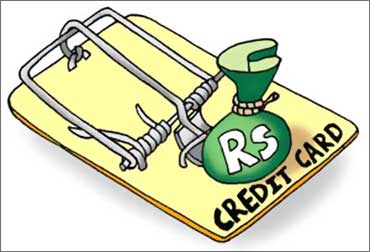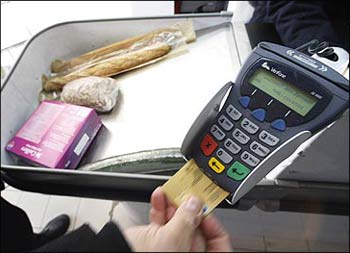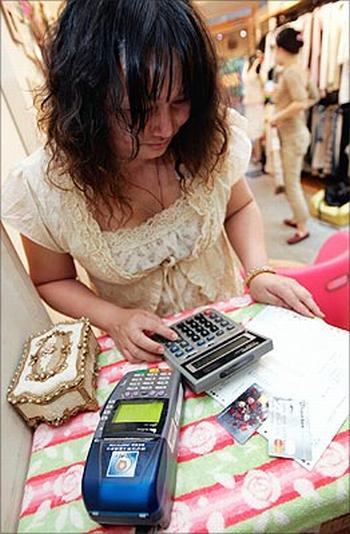How to be safe from credit card fraud.
Tips taken to Safeguard your Cards..
Credit cards have made our lives easier in more ways than one.
But they also leave us susceptible to frauds. Here's how to
protect yourself:
1. What precautions should I take at the time of
making transactions in a shop establishment ?
Before using the credit card, ensure that you have signed
on the signature panel on the reverse of your card with a
non-erasable pen. Also ensure that the amount spent is within
the credit limit sanctioned to you by the credit card company.
Always guard your card, i.e., whenever you hand it over at the
billing counter, be present while the card is being swiped.
Once the transaction is approved, a charge slip will be generated.
Ensure that your name, date of transaction, card number and,
most importantly, the amount billed are correct before signing
the charge slip.
You may also enter the amount in words. At certain shop establishments,
you may be asked to sign on the bill in addition to the charge slip.
You should ensure that the amount on the bill is the same as the amount
on the charge slip.
You must always retain the charge slip till the transaction is
reflected in your credit card statement.
Also ensure that the amount in the statement matches with that of
the charge slip. Any irregularities in your card account
should immediately be brought to the notice of the bank.

Photographs: Reuters
Remember to take back your credit card as soon as the
transaction is completed. Sign only one charge slip per transaction.
If there is an error on the charge slip, don't sign it and ensure
that the erroneous charge slip is destroyed in your presence.
2. How should I avoid any damage to or misuse of the card?
To prevent damage to the card, don't keep it in an area
having a continuous magnetic field, for example, near a TV;
don't scratch or tamper with the magnetic strip that contains
coded information for the security of your card; don't bend
the card or keep two cards with their magnetic strips facing
each other; and keep the card away from extreme heat and
direct sunlight.
Never hand over your card to any stranger or share its
details with anyone, not even to some one claiming to represent the
card-issuing bank or its associates.
Never reveal your PIN (personal identification number) to anyone;
don't keep the card and the ATM PIN together. Surrender the card only
to a designated official of the bank after cutting it diagonally into
two pieces across the magnetic strip.
Keep a record of your credit card numbers and telephone numbers for
reporting lost or stolen cards.

Photographs: Reuters
To avoid frauds in online transactions, the Reserve Bank of India (RBI)
has advised banks to undertake the following risk mitigation for
online card transactions:
1) A system of providing for additional authentication/
based on information not visible on the cards for all online
transactions; and
2) A system of 'online alerts' to the cardholder for all transactions
of the value of Rs 5,000 and above.
3)By taking certain precautions, users can prevent their
credit or debit card from being misused both online and offline:
4) Do not provide photocopies of both the sides of the credit card
to anyone. The card verification value (CVV) which is required
for online transactions is printed on the reverse of the card.
Anyone can use the card for online purchases if the information
is available with them. Do not click on links in emails seeking
details of your account: they could be phishing emails from
fraudsters. Most reputed companies will ask you to visit their
website directly;
5) While using a credit card for making payments online,
check if the website is secure. The address bar will begin with "https".
The CVV will also be required;
6)Do not give any information to persons seeking credit card
information over the phone.
7) Notify your bank/credit card issuer if you do not receive
the monthly credit card statement on time. If a credit card is
misplaced or lost, get it cancelled immediately.

Photographs: Reuters
3) Can a credit card be issued without applying for the same?
Banks/NBFCs have been advised that unsolicited cards should not
be issued. The written consent of the applicant would be required
before issuing a credit card.
If an unsolicited card is issued and activated, the card-issuing bank
shall not only reverse the charges, but also pay a penalty to the
recipient amounting to twice the value of the charges reversed.
Any loss arising out of misuse of such unsolicited cards will be
the responsibility of the card issuing bank/NBFC.
Thursday, April 1, 2010
[Hindi_Jokes] How to be safe from credit card fraud. Tips taken to Safeguard your Cards..
__._,_.___
Also visit our website on Latest Kurtis Collections
MARKETPLACE
.
__,_._,___
Subscribe to:
Post Comments (Atom)
No comments:
Post a Comment